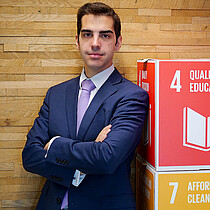Georgios Lampridis
Nationality: Greek
Age: 28
Job: senior consultant at Accenture in Athens
Previous degree: bachelor in international economics, management and finance from Bocconi University

1. What was the main reason for you to choose doing an MBA at RSM?
“I wanted to shift my career towards the sustainability world. RSM is among the top in that field and I wanted the best knowledge and challenge. Also, having an MBA from RSM improves my status and reputation when I talk to people. And of course I wanted to meet new people, be challenged and have influence, live in a new country, and exchange new ideas and cultures.”
2. What expectations did you have of studying for your MBA during the Covid-19 pandemic?
“My expectation were changing all the time, we needed to adapt. We did not have much chance to see our MBA colleagues in the first two terms. It’s more difficult to exchange ideas but everyone is willing to do it so we’re finding other ways to get into that, for example in small groups and through extra-curricular activities. It’s a great opportunity for all of us to rethink and reset our goals in a period where economic growth was under pressure, and start again once the distortion is gone. We’re doing our best.”
3. What has been the biggest adjustment for you, while living in Rotterdam?
“The weather! The Netherlands’ weather is unpredictable. Apart from that, it’s a very diverse country, you can find anything you want. You can learn a lot in in multicultural Rotterdam. It’s not as busy as Amsterdam so you have more freedom to move around. It also combines business and the port, and it’s fun to buy food at the market.”
4. What has been the most challenging assignment or course during the MBA?
“The Living Management Project was the most challenging. It wasn’t the most difficult but it took the most concentration because you implement all the experience and knowledge you have. With a team of five people, everyone wants to bring in their input and there’s enormous time pressure. It was a positive challenge: for the company Orbia we had to work out a marketing strategy and a business operations model. I learned so much, for example about the trends and operations in the agricultural sector, and working with different personalities among the marketing and finance clients. It was great to see how my ideas and skills can capture value.”
5. In what way has the Personal Leadership Development programme (PLD) affected you?
“This is the most important subject in the MBA. Everyone believes they’re the greatest leaders, people don’t admit there are areas of improvement. I’ve been working on stress management – the most important thing a leader should control because it affects your entire team. PLD is helping me a lot. If someone wants to tackle their issues, this course will help them. It’s a game changer, as long as you understand it and use it.”
6. If you had to choose one Sustainable Development Goal, which one would you choose, and why?
“Definitely SDG4: education. Everything starts there and everything changes from there. It’s the enabler and the origin; you need education for everything else. Without it, you don’t understand issues such as our consumption of water, economic growth, and how to create and use partnerships. It all starts with the base. With education you can make an impact and understand sustainability.”
7. Has your MBA journey changed your outlook on what your career will be like after doing an MBA?
“The MBA has helped me expand my potential and goals. I already wanted to change my career towards a sustainability angle. I was looking at the humanitarian approach but now I have a more environmental and social interest. I’m still evaluating what’s more aligned with my goals. Ultimately, I’d like to start my own business but I’ll need more experience first at an organisation that will provide me with necessary tools. I aim to work in the sustainability industry, somewhere in Europe.”
8. What advice could you give to people who are considering doing an MBA?
“Forget who you were in order to understand who you want to be. When you enter the MBA, it’s a whole new world. Be prepared to change, in every aspect.”